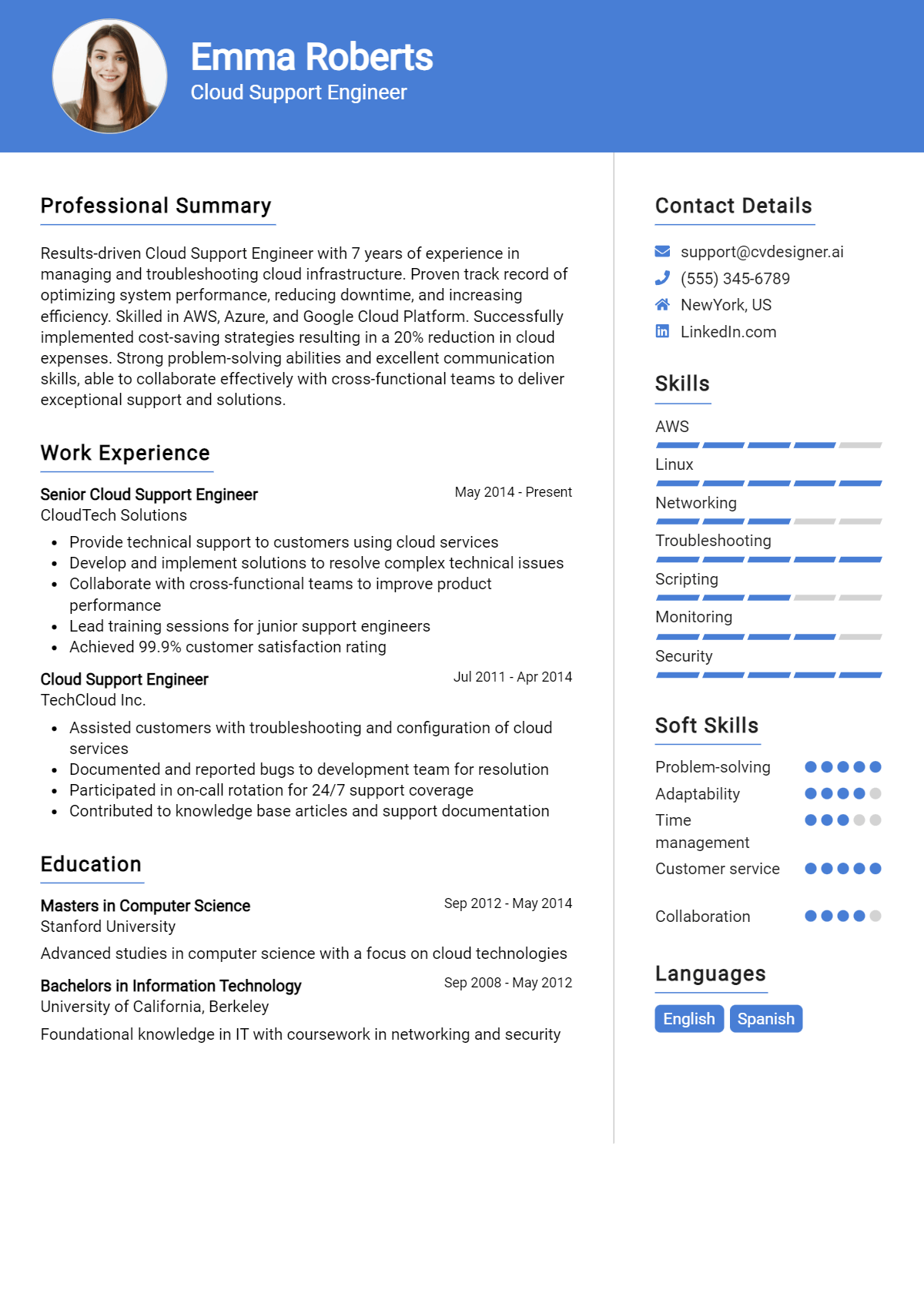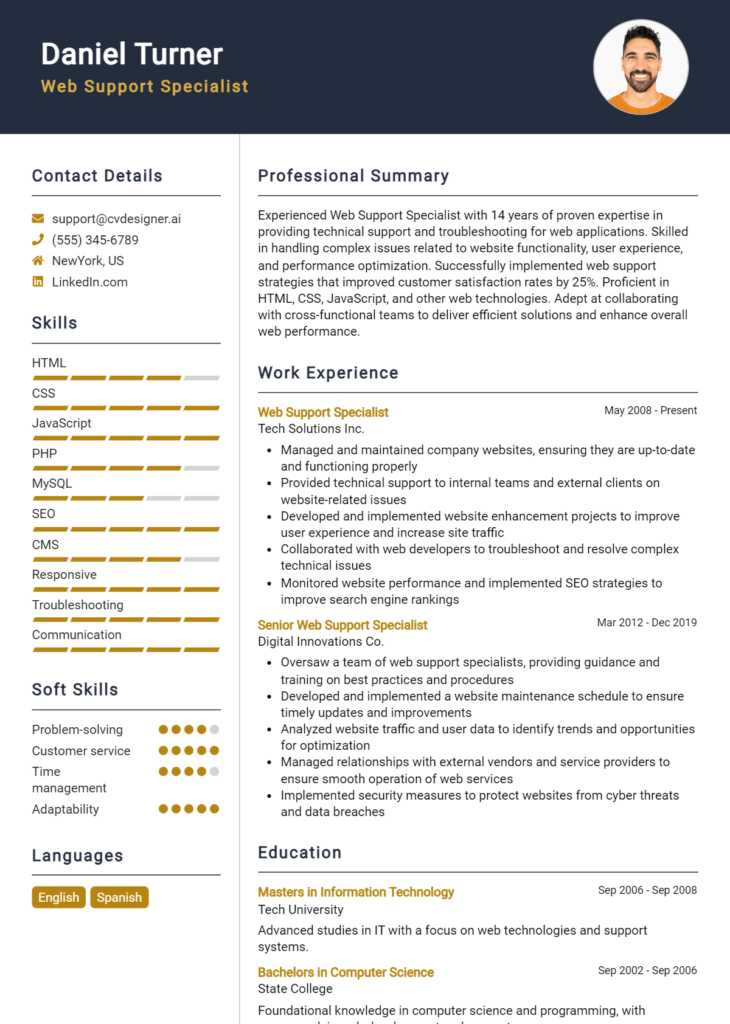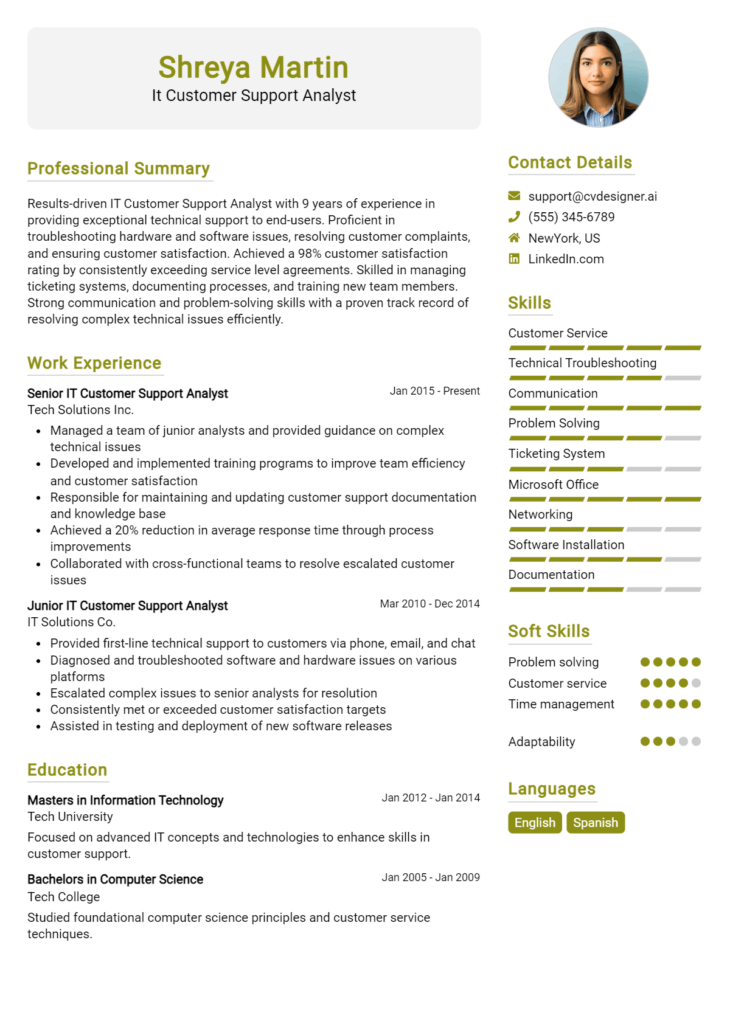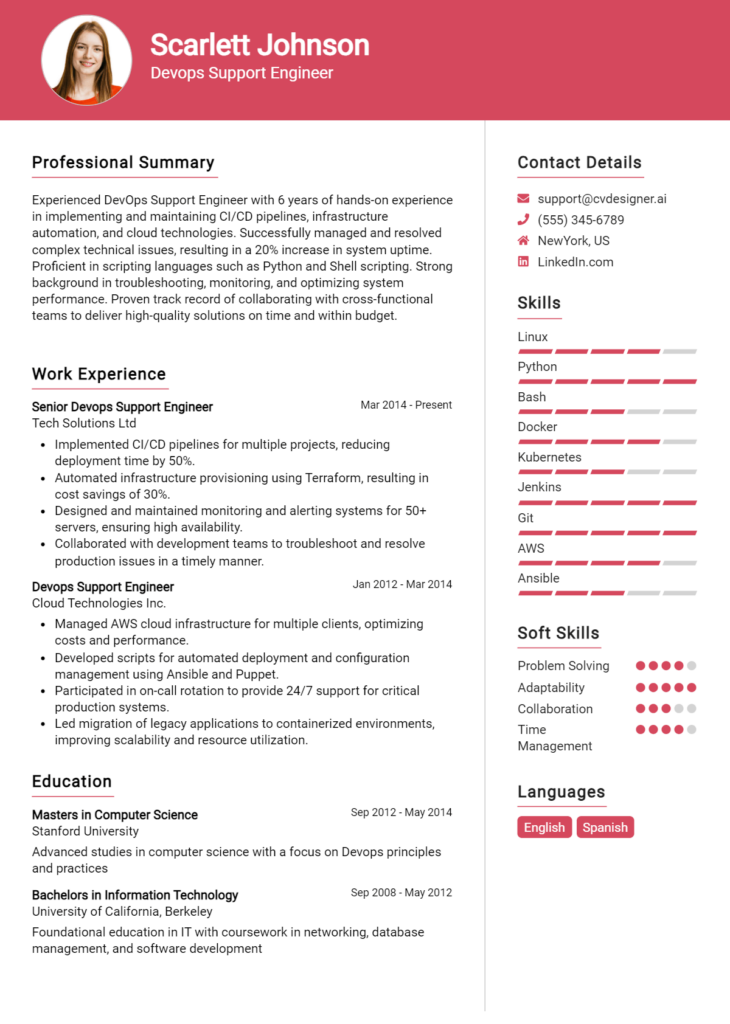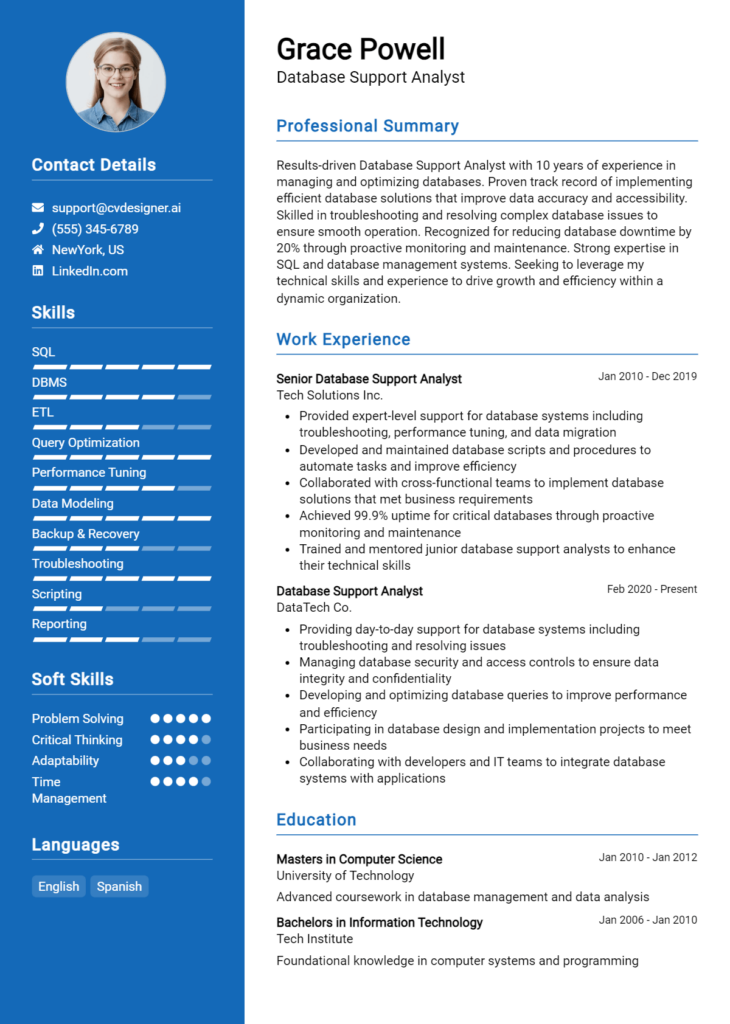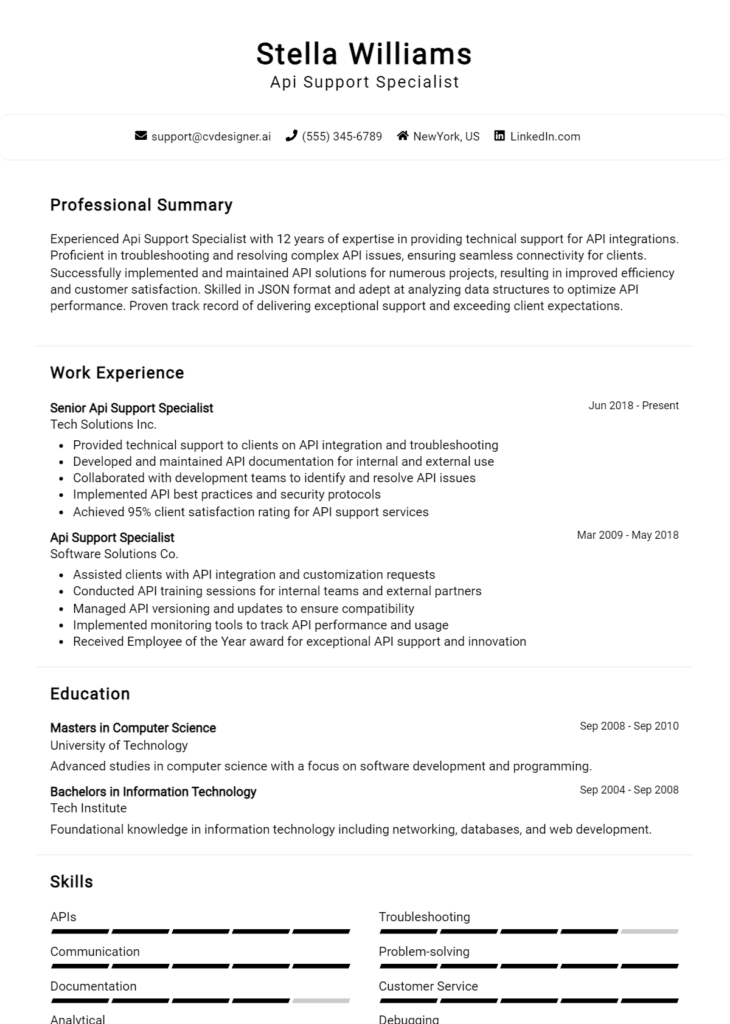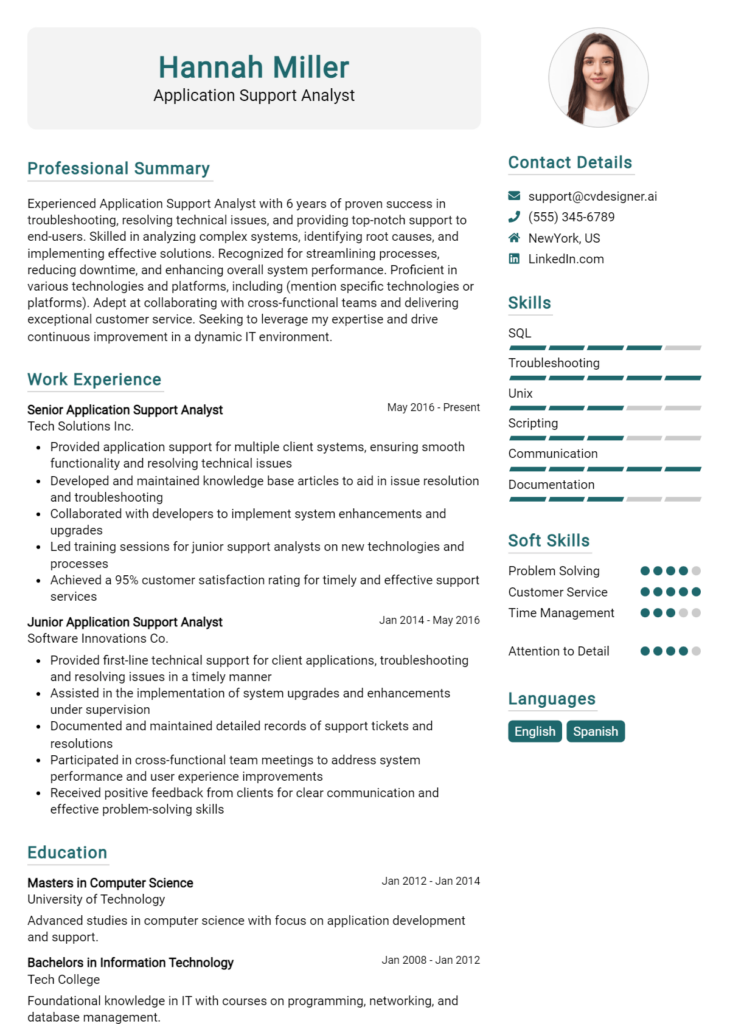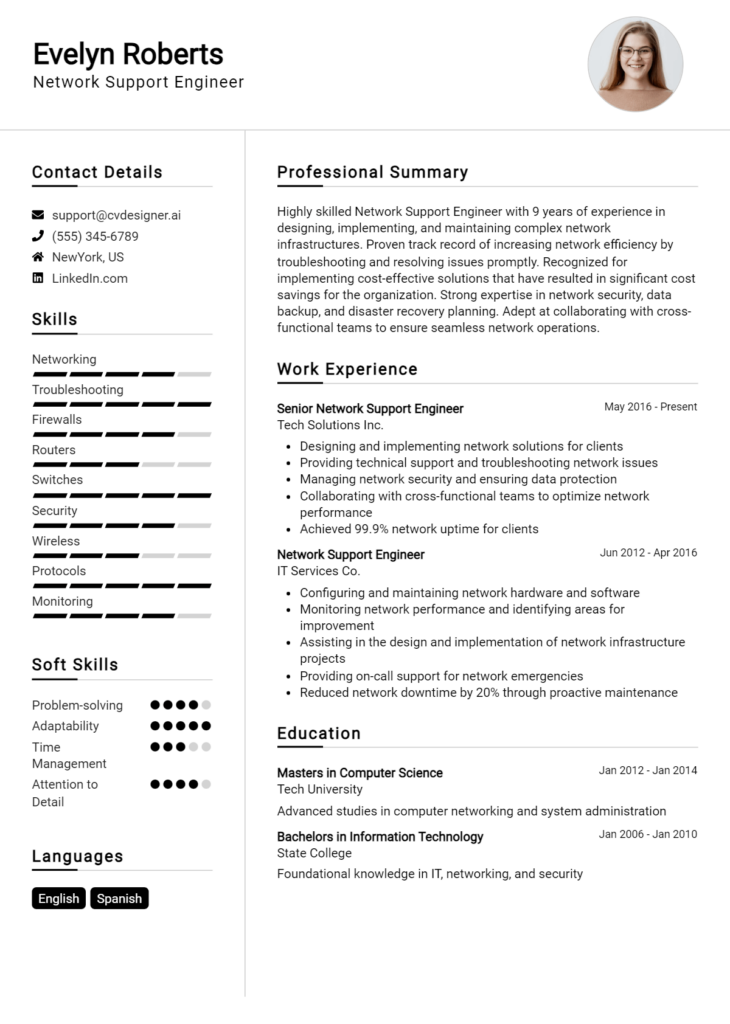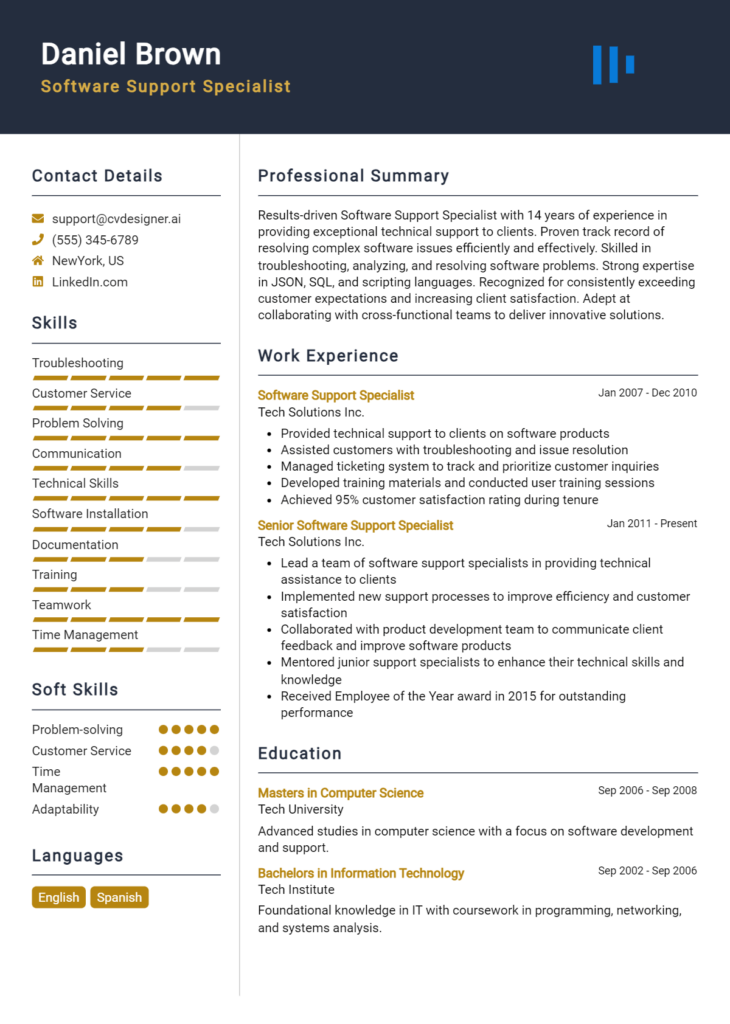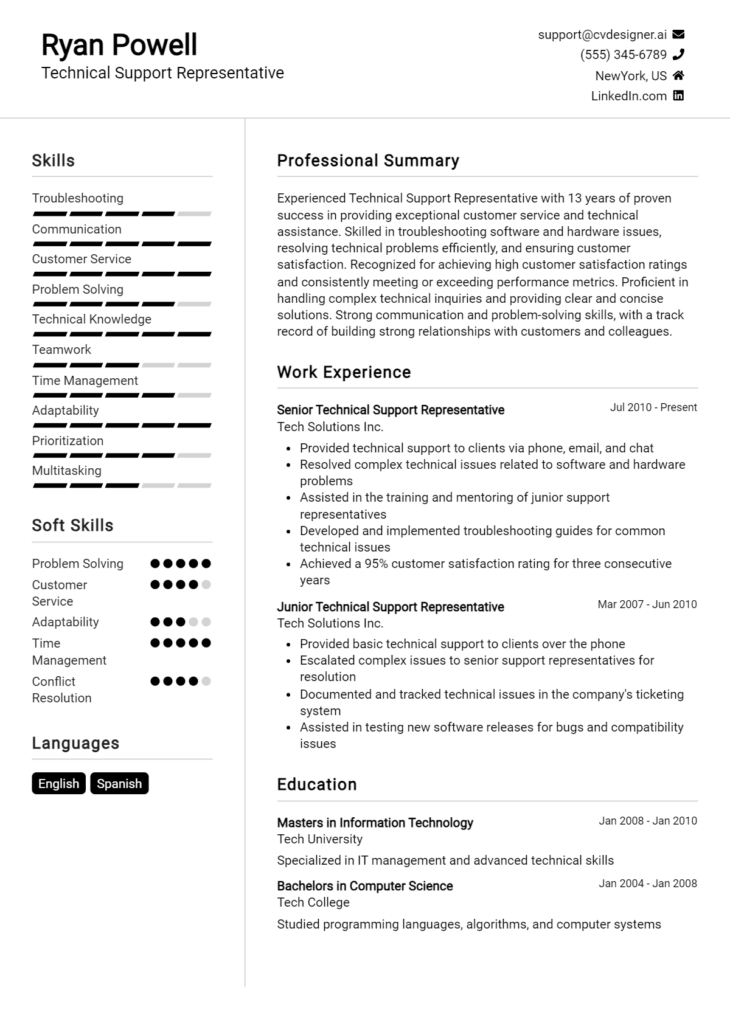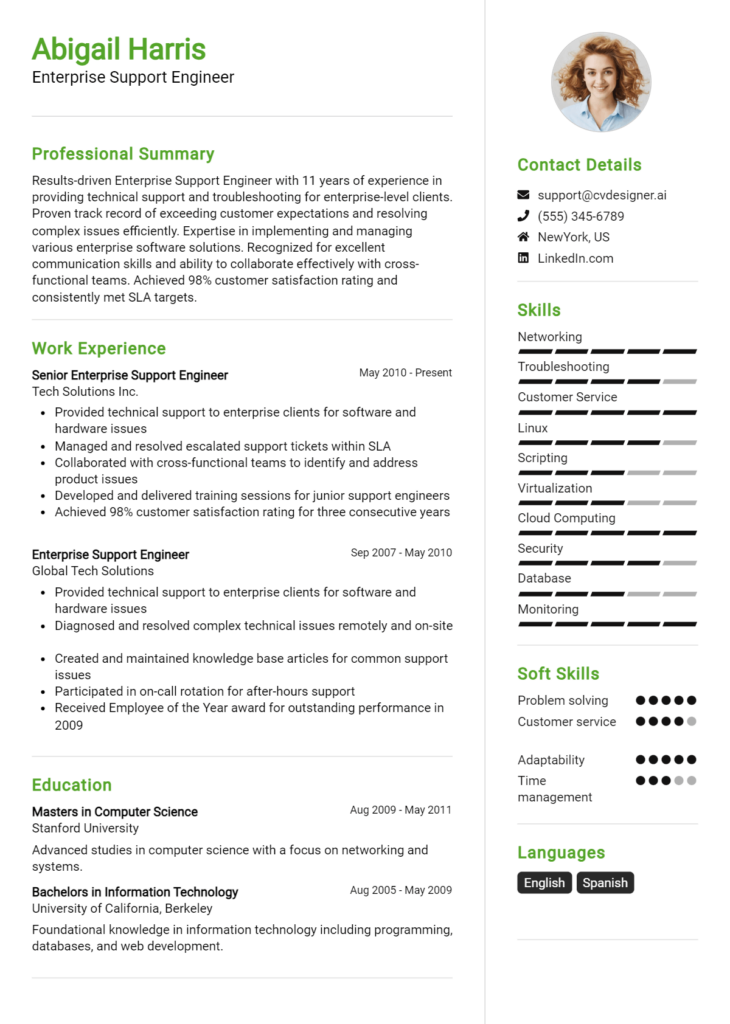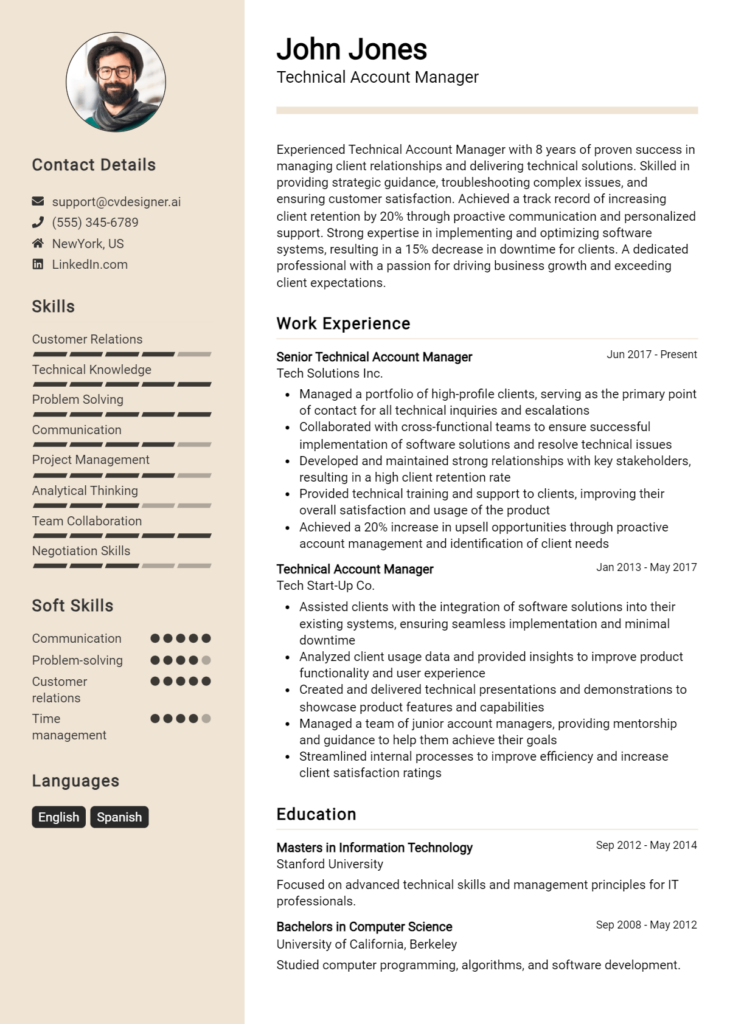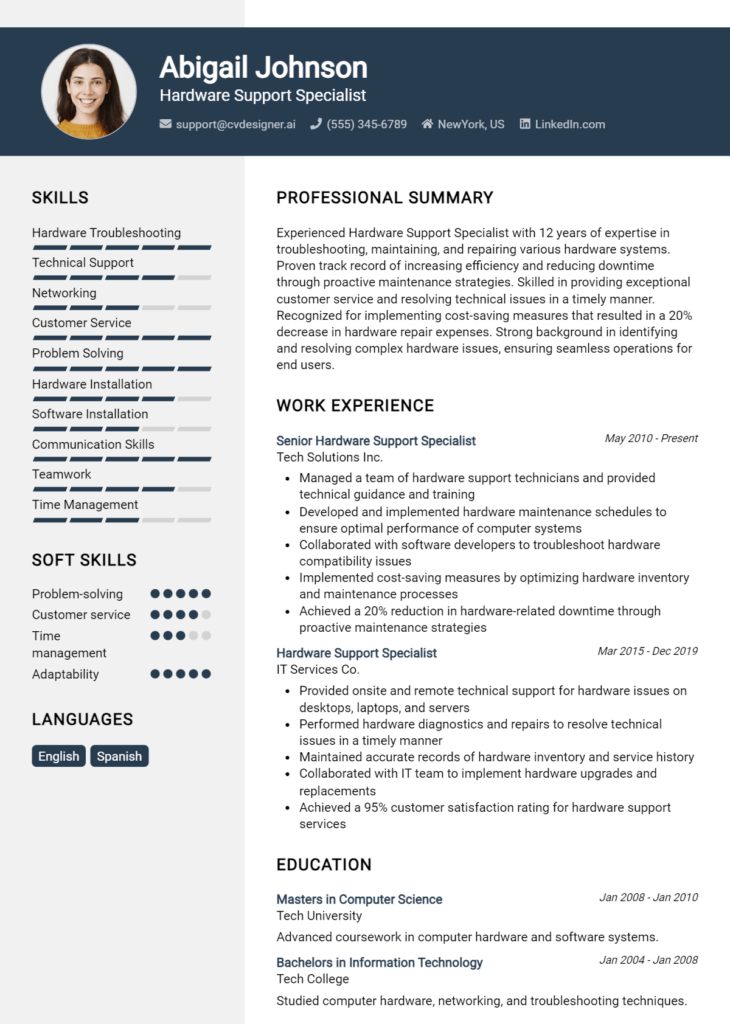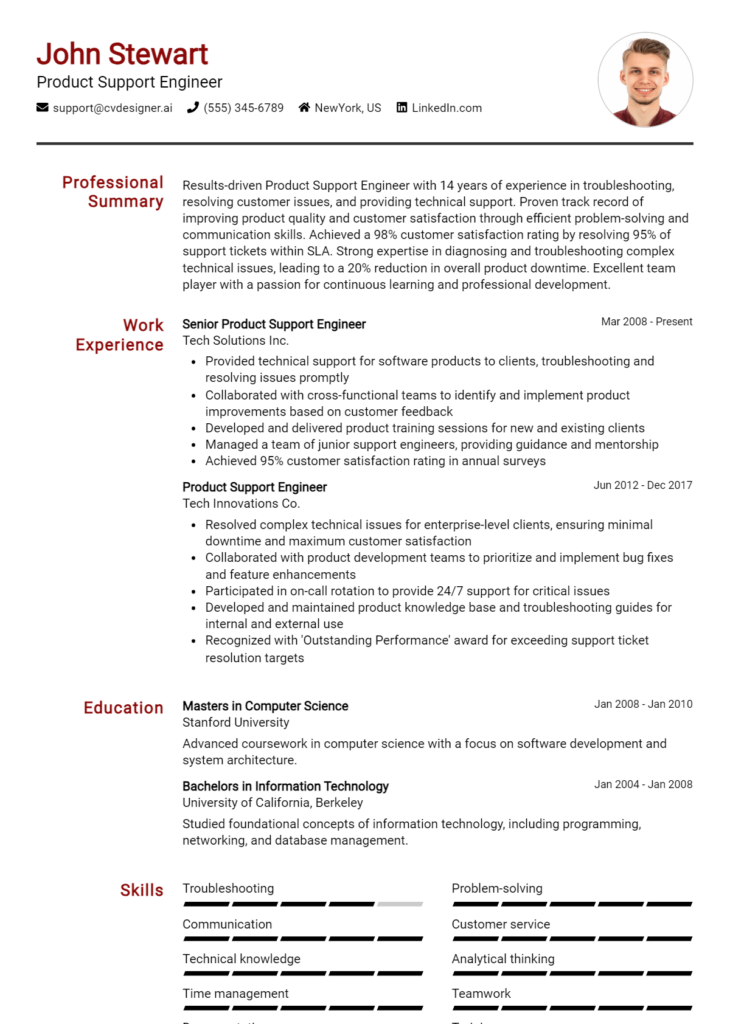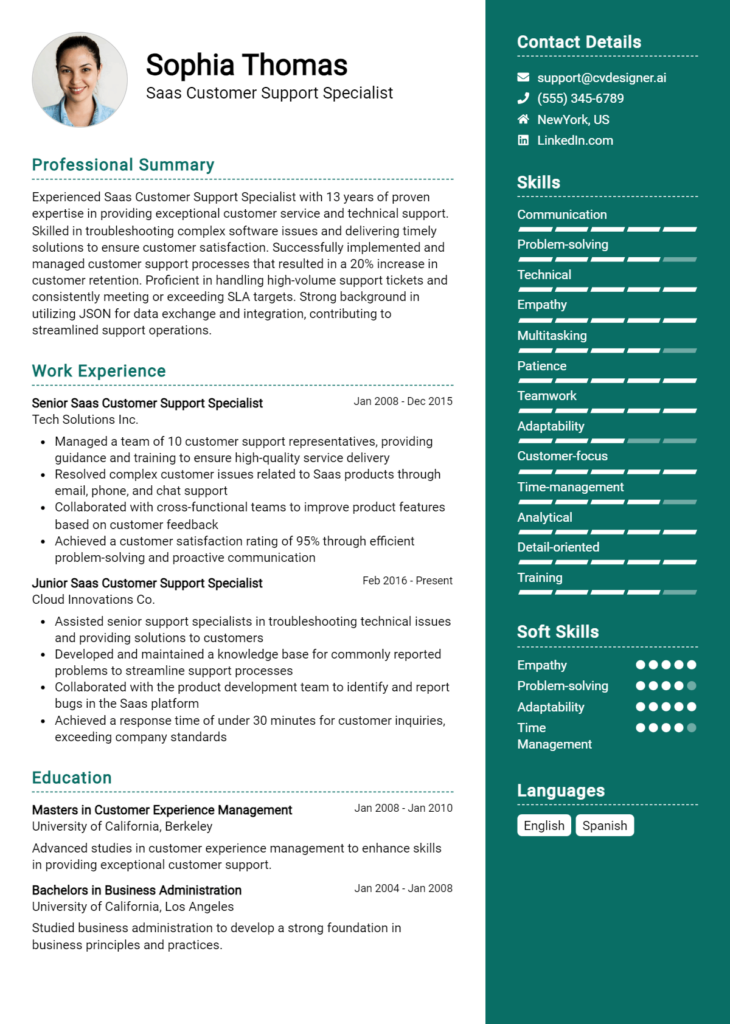Cloud Support Engineer Core Responsibilities
A Cloud Support Engineer plays a vital role in ensuring the seamless operation of cloud services by bridging technical and operational functions across various departments. Key responsibilities include troubleshooting cloud-based issues, collaborating with development and operations teams, and optimizing cloud infrastructure. Essential skills encompass strong problem-solving abilities, technical proficiency in cloud platforms, and effective communication. These competencies contribute significantly to achieving organizational goals, and a well-structured resume can effectively highlight these qualifications to attract potential employers.
Common Responsibilities Listed on Cloud Support Engineer Resume
- Provide technical support for cloud-based applications and services.
- Troubleshoot and resolve cloud infrastructure issues.
- Collaborate with engineering and operations teams on cloud deployments.
- Monitor cloud service performance and implement improvements.
- Document support processes and technical solutions for knowledge sharing.
- Assist in the migration of applications to cloud environments.
- Conduct root cause analysis for recurring issues.
- Implement security measures to protect cloud resources.
- Respond to customer inquiries and provide timely resolutions.
- Maintain up-to-date knowledge of cloud technologies and industry trends.
- Participate in disaster recovery and business continuity planning.
- Train users and team members on cloud service best practices.
High-Level Resume Tips for Cloud Support Engineer Professionals
In today's competitive job market, a well-crafted resume is essential for Cloud Support Engineer professionals aiming to make a lasting impression on potential employers. Your resume is often the first point of contact between you and your future employer, serving as a snapshot of your skills, achievements, and professional journey. It needs to not only showcase your technical expertise but also reflect your ability to solve complex problems and deliver exceptional customer service. This guide will provide practical and actionable resume tips specifically tailored for Cloud Support Engineer professionals, empowering you to stand out in a crowded field.
Top Resume Tips for Cloud Support Engineer Professionals
- Tailor your resume to align with the specific job description, highlighting the most relevant skills and experiences that match the employer’s needs.
- Use clear and concise language to describe your responsibilities and achievements, ensuring that technical jargon is appropriately balanced for the audience.
- Showcase your experience with cloud platforms (e.g., AWS, Azure, Google Cloud) by detailing specific projects and roles that demonstrate your expertise.
- Quantify your achievements with metrics, such as reduced downtime by a certain percentage or improved response times, to provide tangible evidence of your contributions.
- Highlight any relevant certifications (e.g., AWS Certified Solutions Architect) that validate your skills and knowledge in cloud technologies.
- Include soft skills such as communication, teamwork, and problem-solving, as these are crucial for effectively supporting clients and collaborating with teams.
- Incorporate keywords from the job listing to pass Applicant Tracking Systems (ATS) and grab the attention of hiring managers.
- Keep your resume format clean and professional, using bullet points for easy readability and ensuring consistency in font and style.
- Consider adding a summary statement at the top of your resume that encapsulates your professional identity and key qualifications in a few impactful sentences.
- Regularly update your resume with new skills, certifications, and accomplishments to keep it current and relevant as you progress in your career.
Implementing these tips can significantly increase your chances of landing a job in the Cloud Support Engineer field. By presenting a polished and tailored resume, you not only showcase your technical prowess but also demonstrate your understanding of the role and the value you can bring to potential employers. A strong resume serves as a powerful tool to open doors and propel you towards your career goals.
Why Resume Headlines & Titles are Important for Cloud Support Engineer
In the competitive field of cloud computing, a Cloud Support Engineer plays a pivotal role in maintaining and optimizing cloud-based systems, ensuring seamless operations for clients. A well-crafted resume headline or title is essential for showcasing a candidate's qualifications in a succinct manner. It serves as the first impression, capable of grabbing the attention of hiring managers within seconds. A strong headline encapsulates a candidate’s core competencies and aligns closely with the job requirements, making it easier for employers to identify the right fit for their teams. By being concise, relevant, and directly related to the position, an impactful headline sets the tone for the rest of the resume and can significantly enhance a candidate's chances of landing an interview.
Best Practices for Crafting Resume Headlines for Cloud Support Engineer
- Keep it concise: Aim for one to two lines that summarize your expertise.
- Be specific: Tailor the headline to reflect the specific role of Cloud Support Engineer.
- Highlight key skills: Incorporate relevant technical skills or certifications.
- Use action words: Employ dynamic verbs to convey your contributions effectively.
- Include relevant experience: Mention years of experience or notable achievements.
- Align with job description: Reflect the language and requirements found in the job listing.
- Avoid jargon: Use clear language that is easily understood by a diverse audience.
- Showcase your value: Convey what sets you apart from other candidates.
Example Resume Headlines for Cloud Support Engineer
Strong Resume Headlines
"Cloud Support Engineer with 5+ Years of Experience in AWS and Azure Solutions"
“Certified Cloud Practitioner Specializing in Troubleshooting and System Optimization”
“Results-Driven Cloud Support Engineer with Proven Track Record in Client Satisfaction and System Uptime”
Weak Resume Headlines
“Experienced Engineer Looking for Cloud Job”
“IT Professional Seeking Opportunities”
Strong headlines are effective because they immediately communicate the candidate's expertise, relevant experience, and potential contributions to the hiring organization. They are specific, engaging, and tailored to the role, making it easy for hiring managers to recognize a candidate's value. In contrast, weak headlines lack clarity and specificity, often coming across as generic or uninspired. This failure to differentiate themselves can result in missed opportunities, as hiring managers may overlook candidates who do not present their qualifications effectively.
Writing an Exceptional Cloud Support Engineer Resume Summary
A well-crafted resume summary is a crucial component for a Cloud Support Engineer, as it serves as the first impression for hiring managers. This brief yet impactful section quickly encapsulates a candidate's key skills, relevant experience, and notable accomplishments that align with the job requirements. A strong resume summary not only grabs attention but also succinctly conveys the value the candidate can bring to the organization, making it essential to tailor this section for each specific job application.
Best Practices for Writing a Cloud Support Engineer Resume Summary
- Quantify achievements: Use numbers and specific metrics to demonstrate your impact in previous roles.
- Focus on skills: Highlight both technical and soft skills that are relevant to cloud support.
- Tailor the summary: Customize your summary to align with the job description and company culture.
- Keep it concise: Aim for 3-5 sentences that deliver maximum impact without being overly verbose.
- Use strong action verbs: Start sentences with powerful verbs to convey confidence and proactivity.
- Showcase relevant experience: Mention specific cloud platforms and technologies you are familiar with.
- Address customer focus: Emphasize your commitment to customer satisfaction and problem-solving abilities.
- Reflect industry terminology: Incorporate keywords from the cloud computing industry to resonate with hiring managers.
Example Cloud Support Engineer Resume Summaries
Strong Resume Summaries
Results-driven Cloud Support Engineer with over 5 years of experience in managing cloud infrastructure for Fortune 500 companies. Successfully reduced service downtime by 30% through proactive monitoring and troubleshooting, ensuring seamless user experiences.
Dedicated Cloud Support Engineer skilled in AWS and Azure, having resolved over 1,000 customer support tickets with a 95% satisfaction rate. Proven ability to implement automation solutions that improved response times by 40%.
Innovative Cloud Support Engineer with expertise in multi-cloud environments, specializing in security compliance and data migration. Achieved a 25% cost reduction in cloud expenditures for clients by optimizing resource allocations.
Weak Resume Summaries
Cloud Support Engineer with some experience in cloud services. Looking for a new opportunity to grow my skills.
Experienced professional in IT support, seeking a position related to cloud technologies. I am a fast learner and can adapt to new challenges.
The strong resume summaries are effective because they clearly articulate the candidate's specific achievements, relevant skills, and direct contributions to their previous roles, making them stand out to hiring managers. In contrast, the weak summaries lack detail and fail to convey quantifiable results or specific expertise, resulting in a generic portrayal that does not engage potential employers.
Work Experience Section for Cloud Support Engineer Resume
The work experience section of a Cloud Support Engineer resume plays a crucial role in illustrating a candidate's technical skills and competencies. This section not only highlights the applicant's hands-on experience with cloud technologies but also demonstrates their capability to manage teams and deliver high-quality solutions. By quantifying achievements and aligning their experiences with industry standards, candidates can effectively convey their value to prospective employers, showcasing their readiness to tackle the complexities of cloud support and engineering roles.
Best Practices for Cloud Support Engineer Work Experience
- Highlight relevant cloud technologies and platforms you have worked with, such as AWS, Azure, or Google Cloud.
- Quantify your achievements with metrics, such as the percentage of uptime maintained or the number of incidents resolved.
- Demonstrate collaboration by mentioning cross-functional teams you have worked with and the results achieved.
- Use action verbs to describe your responsibilities and accomplishments, such as "implemented," "optimized," or "led."
- Focus on outcomes, detailing how your contributions improved systems, processes, or customer satisfaction.
- Align your experience with industry standards and best practices, showing knowledge of compliance and security protocols.
- Provide context for your roles, explaining the scope of your projects and your specific contributions.
- Tailor your experience to the job description, emphasizing skills and experiences that match the requirements of the position.
Example Work Experiences for Cloud Support Engineer
Strong Experiences
- Led a team of 5 engineers to migrate a legacy application to AWS, achieving a 30% reduction in operational costs and improving system reliability by 25%.
- Implemented a comprehensive monitoring solution that increased system uptime from 98% to 99.9%, resulting in a 40% decrease in incident response time.
- Collaborated with cross-functional teams to develop a cloud security framework, which enhanced compliance with industry standards and reduced security incidents by 50%.
- Designed and executed a training program for junior cloud engineers, improving team efficiency and reducing onboarding time by 20%.
Weak Experiences
- Worked on cloud projects and helped with various tasks.
- Participated in team meetings and contributed to discussions about cloud technologies.
- Assisted in resolving customer issues related to cloud services.
- Gained experience in cloud computing through various roles.
The examples listed as strong experiences are considered effective because they quantify achievements, detail specific contributions, and showcase leadership and collaboration in relevant projects. In contrast, the weak experiences lack specificity and measurable outcomes, making them less impactful. Strong experiences demonstrate clear value and results, while weak experiences fail to convey the candidate's capabilities and contributions comprehensively.
Education and Certifications Section for Cloud Support Engineer Resume
The education and certifications section of a Cloud Support Engineer resume is crucial for demonstrating a candidate's academic foundation and commitment to professional development. This section not only highlights relevant degrees and certifications but also showcases the individual's dedication to continuous learning in a rapidly evolving field. By providing pertinent coursework and specialized training, candidates can significantly enhance their credibility and alignment with the requirements of the job role, making them more attractive to potential employers.
Best Practices for Cloud Support Engineer Education and Certifications
- Highlight degrees in fields such as Computer Science, Information Technology, or Engineering.
- Include industry-recognized certifications like AWS Certified Solutions Architect, Microsoft Certified: Azure Administrator Associate, or Google Cloud Professional Cloud Architect.
- Showcase any relevant coursework that pertains to cloud computing, networking, or systems administration.
- List certifications in order of relevance and latest completion date to showcase your current expertise.
- Include any specialized training programs or workshops that enhance your skill set in cloud technologies.
- Indicate honors or distinctions received during your academic career to further validate your skills and knowledge.
- Provide links to online profiles or digital badges for certifications to enhance credibility.
- Regularly update this section to reflect new achievements and keep it relevant to the cloud industry trends.
Example Education and Certifications for Cloud Support Engineer
Strong Examples
- Bachelor of Science in Computer Science, University of Technology, 2021
- AWS Certified Solutions Architect – Associate, AWS, 2022
- Google Cloud Professional Cloud Architect, Google Cloud, 2023
- Relevant Coursework: Cloud Computing Fundamentals, Network Security, Database Management Systems
Weak Examples
- Bachelor of Arts in English Literature, University of Arts, 2019
- CompTIA A+ Certification (obtained in 2015)
- Microsoft Office Specialist Certification, 2020
- High School Diploma, Graduated 2017
The strong examples are considered relevant because they reflect educational qualifications and certifications that directly align with the responsibilities and skills required for a Cloud Support Engineer role. They indicate a solid foundation in computer science and a commitment to cloud technologies. In contrast, the weak examples demonstrate a lack of relevance to the field; degrees in unrelated subjects and outdated certifications do not support the specific requirements of the position, potentially diminishing the candidate's appeal to employers.
Top Skills & Keywords for Cloud Support Engineer Resume
In the competitive field of cloud computing, having the right skills is crucial for a Cloud Support Engineer. A well-crafted resume showcases not only technical expertise but also interpersonal abilities that enhance collaboration and problem-solving. Cloud Support Engineers are often the first line of defense in ensuring that cloud services run smoothly, making it essential for candidates to highlight their proficiency in both hard and soft skills. By strategically incorporating relevant skills into their resumes, candidates can effectively demonstrate their qualifications and set themselves apart from the competition.
Top Hard & Soft Skills for Cloud Support Engineer
Soft Skills
- Excellent communication skills
- Strong problem-solving abilities
- Customer service orientation
- Team collaboration
- Adaptability and flexibility
- Critical thinking
- Attention to detail
- Time management
- Empathy and patience
- Conflict resolution skills
Hard Skills
- Proficiency in cloud platforms (AWS, Azure, Google Cloud)
- Understanding of cloud architecture and deployment
- Knowledge of networking concepts (TCP/IP, DNS, VPN)
- Familiarity with scripting languages (Python, Bash, PowerShell)
- Experience with containerization (Docker, Kubernetes)
- Database management and SQL knowledge
- Monitoring and troubleshooting cloud services
- Security best practices in cloud environments
- Familiarity with CI/CD tools (Jenkins, GitLab)
- Understanding of virtualization technologies (VMware, Hyper-V)
Stand Out with a Winning Cloud Support Engineer Cover Letter
I am writing to express my interest in the Cloud Support Engineer position at [Company Name] as advertised on [where you found the job posting]. With a strong background in cloud technologies and a passion for providing exceptional customer support, I am excited about the opportunity to contribute to your team. My experience working with various cloud platforms, combined with my technical problem-solving skills, makes me a suitable candidate for this role.
In my previous position at [Previous Company Name], I successfully managed a diverse range of cloud-related issues, including troubleshooting, system monitoring, and performance optimization. I collaborated closely with clients to ensure their cloud environments were running smoothly, quickly addressing any concerns and implementing effective solutions. My hands-on experience with AWS, Azure, and Google Cloud Platform has equipped me with the knowledge and skills necessary to assist customers in maximizing their cloud investments. I take pride in my ability to communicate complex technical concepts in a clear and concise manner, ensuring clients feel supported and informed throughout the support process.
I am particularly drawn to [Company Name] because of your commitment to innovation and customer satisfaction in cloud services. I admire your focus on continuous improvement and believe that my proactive approach to problem-solving aligns well with your organizational values. I am eager to bring my expertise in cloud technologies and my dedication to client success to your esteemed company, contributing to the delivery of top-notch cloud support services.
Thank you for considering my application. I look forward to the opportunity to discuss how my skills and experiences align with the needs of your team. I am enthusiastic about the possibility of contributing to [Company Name] and helping clients achieve their cloud goals.
Common Mistakes to Avoid in a Cloud Support Engineer Resume
When crafting a resume for a Cloud Support Engineer position, it's essential to present your skills and experiences effectively. However, many candidates make common mistakes that can undermine their application. Avoiding these pitfalls can significantly enhance your chances of getting noticed by hiring managers. Here are some frequent errors to be aware of:
Lack of Relevant Keywords: Failing to include industry-specific keywords can make your resume less searchable by applicant tracking systems (ATS), potentially causing it to be overlooked.
Generic Objective Statements: Using vague or generic objectives does not capture the attention of recruiters. Tailor your objective to reflect your specific interest in the role and how your skills align with the company's needs.
Overloading with Technical Jargon: While technical skills are crucial, overloading your resume with jargon can alienate non-technical hiring managers. Strike a balance by explaining your skills in an accessible manner.
Ignoring Soft Skills: Cloud Support Engineers need strong communication and problem-solving skills. Neglecting to highlight these can give the impression that you are solely focused on technical abilities.
Inconsistent Formatting: A cluttered or inconsistent format can make your resume difficult to read. Ensure that your font, bullet points, and headings are uniform throughout for a professional appearance.
Failure to Quantify Achievements: Simply listing responsibilities without quantifying your achievements can dilute your impact. Use metrics and specific examples to demonstrate the value you’ve added in past roles.
Not Tailoring for Each Application: Sending out a one-size-fits-all resume can be detrimental. Take the time to tailor your resume for each job application, reflecting the specific skills and experiences that match the job description.
Neglecting to Proofread: Spelling and grammar errors can create a negative impression. Always proofread your resume multiple times or ask someone else to review it for clarity and accuracy.
Conclusion
As a Cloud Support Engineer, you play a crucial role in ensuring that cloud services run smoothly and efficiently for clients. Throughout this article, we have explored essential skills required for this role, including strong troubleshooting abilities, in-depth knowledge of cloud platforms, excellent communication skills, and a solid understanding of networking and security principles. Additionally, we have highlighted the importance of staying updated with the latest technology trends and certifications to enhance your professional growth in the cloud computing landscape.
In conclusion, it’s vital to present your qualifications and experiences effectively through a well-crafted resume that stands out to potential employers. We encourage you to review your Cloud Support Engineer resume and consider utilizing various resources available to enhance it. Check out these tools to help you create a polished and professional resume:
- Explore resume templates to find a design that suits your style and profession.
- Use the resume builder to effortlessly put together your resume while ensuring all necessary details are included.
- Look at resume examples from professionals in your field for inspiration and guidance.
- Don’t forget to craft a strong first impression with cover letter templates that complement your resume.
Take action today and refine your resume to better showcase your skills and experiences as a Cloud Support Engineer!

